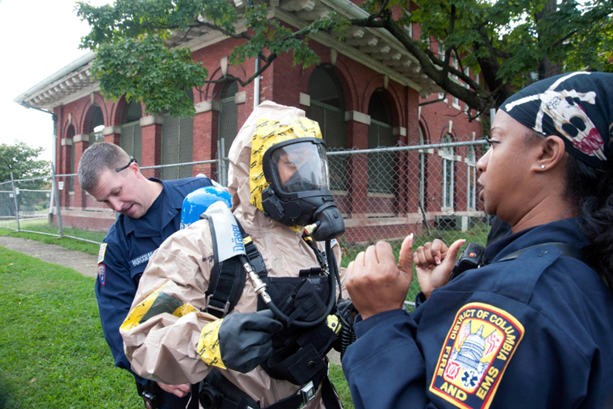 Every day, the National Guard responds to requests from civilian authorities during emergencies within our country. Saving lives and protecting property is a duty the Guard provides faithfully and without question. Whether responding within the District of Columbia or across state borders, the D.C. National Guard does what it takes to help Americans during times of crisis.
Every day, the National Guard responds to requests from civilian authorities during emergencies within our country. Saving lives and protecting property is a duty the Guard provides faithfully and without question. Whether responding within the District of Columbia or across state borders, the D.C. National Guard does what it takes to help Americans during times of crisis.
The 33rd Civil Support Team is one of 57, on-call, federally-funded, state-level, National Guard units designed to augment local and regional terrorism response capabilities in events known or suspected to involve Weapons of Mass Destruction. The 33rd CST is a part of a 10-state response sector which includes a 6-state Federal Emergency Management Agency region and 3-state National Capital Region response sector.
The CSTs have the capability to deploy within hours to an affected area of operations. On site, the CST's role is to 1. Identify a WMD agent/substance. 2. Assess consequences of a suspected CBRN event in support of a local Incident Commander. 3. Advise civilian responders regarding appropriate response actions. 4. Assist requests for assistance to expedite arrival of additional state and federal assets to help save lives, prevent human suffering, and mitigate great property damage.
The 113th Aerospace Control Alert Detachment is incorporated from the 113th Wing's 113th Operations and Maintenance Groups at Joint Base Andrews, Md. The detachment, maintains the ability to quickly scramble aircraft in response to airborne threats in the National Capital Region, and during identified large gatherings and high profile events. Immediately after September 11, 2001, the 113th Wing was one of the fighter units designated for the Air National Guard-specific NORAD mission in support of Operation Noble Eagle. Dedicated aircrew, maintainers and controllers conduct 24/7 alert operations in coordination with active duty and federal organization to provide mission coverage over the nation's most active air space. The 113th ACAD is the busiest unit of its kind with more than 5000 recorded alert responses.
The District of Columbia Army National Guard's Aviation entities consist of an Army Aviation Support Facility (AASF), Detachment 1 Company A 1-224th Aviation (Security & Support), Company D 1-224th Aviation (Air Ambulance), Detachment 1 Company C 1-226th Aviation (Air Ambulance) and Detachment 4 OSACOM that supports "real world" operations while continuing to provide training support to units and civilian agencies within the National Capitol Region. The AASF provides VIP transportation to the DCARNG Commanding General, Federal Emergency Management Agency, National Guard Bureau Joint Staff and DoD personnel. The AASF provided a standby medevac crew in support of the Fort Belvoir Community Hospital and Walter Reed National Military Medical Center, which maintains the continuation training for DCARNG flight crews. The AASF is prepared to launch a medevac crew within 15 minutes of receiving an emergency call.